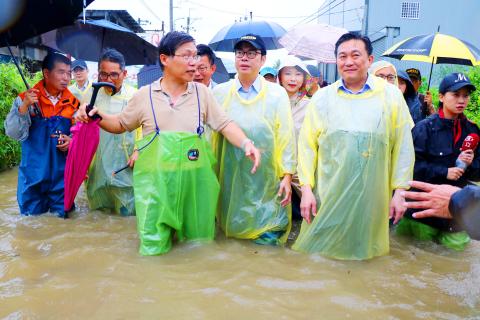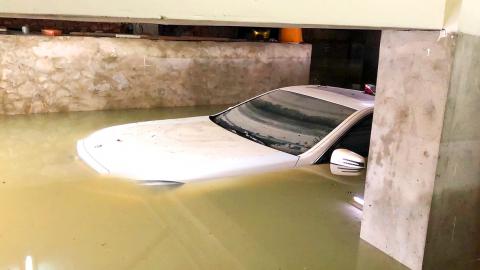Heavy rain yesterday killed a motorcyclist in Kaohsiung and forced the Tainan City Government to cancel work and classes.
The heavy rains that affected central and southern Taiwan were triggered by a southwesterly wind interacting with a convection circulation.
The Pingtung County Government closed schools and offices in Chunrih Township (春日) due to road damage.

Photo: Wan Yu-chen, Taipei Times
TV news footage showed Tainan residents pushing motorcycles through the floodwaters. In Rende District (仁德), which was severely affected, police on patrol waded through floodwaters instead of riding scooters.
Some people tried in vain to salvage their vehicles.
“When I came downstairs, my car was already deep in water. It all happened in 20 minutes,” a man told a TV news reporter.

Photo: Wang Chieh, Taipei Times
A man in Tainan’s Yongkang District (永康) said that yesterday’s rain was worse than the flooding during Typhoon Morakot in August 2009, a storm that killed 619 people.
Central Weather Bureau statistics showed that at 325.5mm Tainan received the most rain from 12am to 4pm. Pingtung followed with 279mm and Kaohsiung with 269.5mm, while two or three observation stations south of Taichung recorded rain that exceeded 100mm per hour.
Tainan nearly had torrential rain, which is 350mm of rain accumulated within 24 hours. Pingtung and Kaohsiung had extremely heavy rain, which the bureau classifies as 200mm of rain in 24 hours.
The interaction of high humidity, the southwesterly wind and convection circulation at 12am contributed to the extremely heavy rain that happened in such a short period of time, bureau forecaster Chen Yi-hsiu (陳依秀) said.
Taiwan is in a zone of low pressure, in which the southwesterly wind is the dominant force, stretching from Japan and South Korea to the Philippines and the South China Sea, Chen said, adding that the nation would experience the effects of the southwesterly wind until Sunday.
Rain is expected again in central and southern Taiwan early this morning, but it would not be as strong as yesterday, she said.
From tomorrow to Friday, the wind is expected to strengthen due to Typhoon Krosa, which is forecast to move toward Japan and South Korea today and tomorrow, she said, adding that rain is forecast from tomorrow afternoon through Friday night.
Although the possibility of torrential rain is not excluded, heavy to extremely heavy rain is forecast for central and southern Taiwan before Sunday, Chen said.
Former bureau Weather Forecast Center director Daniel Wu (吳德榮) said that the atmosphere within the monsoon trough is more unstable than the one during the plum rain season.
Its ability to trigger severe weather — including thunder and lightning, strong wind, heavy precipitation, tornadoes and consecutive heavy rain — is similar to that of the plum rain season, he added.
The southwesterly wind was produced by Tropical Depression Lekima, Weatherrisk Explore chief executive officer Peng Chi-ming (彭啟明) said.
“Typhoon Krosa’s development has strengthened the southwest monsoon, which in turn increased humidity near Taiwan and made meteorological conditions unstable along the central and southwest coasts, worsening the chances of convections, lightning and tornadoes,” Peng said.

PREPAREDNESS: Given the difficulty of importing ammunition during wartime, the Ministry of National Defense said it would prioritize ‘coproduction’ partnerships A newly formed unit of the Marine Corps tasked with land-based security operations has recently replaced its aging, domestically produced rifles with more advanced, US-made M4A1 rifles, a source said yesterday. The unnamed source familiar with the matter said the First Security Battalion of the Marine Corps’ Air Defense and Base Guard Group has replaced its older T65K2 rifles, which have been in service since the late 1980s, with the newly received M4A1s. The source did not say exactly when the upgrade took place or how many M4A1s were issued to the battalion. The confirmation came after Chinese-language media reported

The Taiwanese passport ranked 33rd in a global listing of passports by convenience this month, rising three places from last month’s ranking, but matching its position in January last year. The Henley Passport Index, an international ranking of passports by the number of designations its holder can travel to without a visa, showed that the Taiwan passport enables holders to travel to 139 countries and territories without a visa. Singapore’s passport was ranked the most powerful with visa-free access to 192 destinations out of 227, according to the index published on Tuesday by UK-based migration investment consultancy firm Henley and Partners. Japan’s and

A Ministry of Foreign Affairs official yesterday said that a delegation that visited China for an APEC meeting did not receive any kind of treatment that downgraded Taiwan’s sovereignty. Department of International Organizations Director-General Jonathan Sun (孫儉元) said that he and a group of ministry officials visited Shenzhen, China, to attend the APEC Informal Senior Officials’ Meeting last month. The trip went “smoothly and safely” for all Taiwanese delegates, as the Chinese side arranged the trip in accordance with long-standing practices, Sun said at the ministry’s weekly briefing. The Taiwanese group did not encounter any political suppression, he said. Sun made the remarks when

BROAD AGREEMENT: The two are nearing a trade deal to reduce Taiwan’s tariff to 15% and a commitment for TSMC to build five more fabs, a ‘New York Times’ report said Taiwan and the US have reached a broad consensus on a trade deal, the Executive Yuan’s Office of Trade Negotiations said yesterday, after a report said that Washington is set to reduce Taiwan’s tariff rate to 15 percent. The New York Times on Monday reported that the two nations are nearing a trade deal to reduce Taiwan’s tariff rate to 15 percent and commit Taiwan Semiconductor Manufacturing Co (TSMC, 台積電) to building at least five more facilities in the US. “The agreement, which has been under negotiation for months, is being legally scrubbed and could be announced this month,” the paper said,